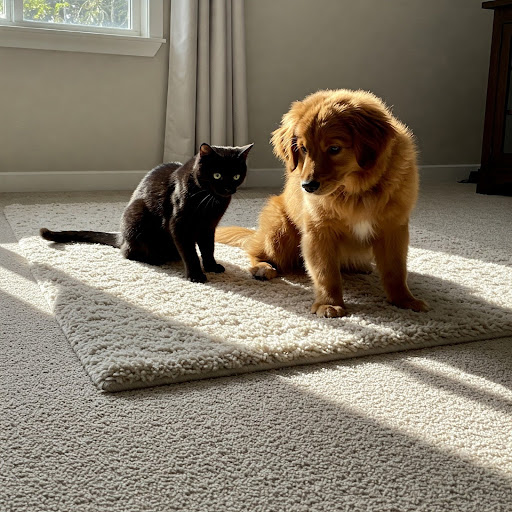
How to Improve Air Quality for Pets?
Your pets count on you to keep them happy and safe. Part of that responsibility is ensuring they breathe clean, healthy air in your home. Allergens, pollutants, and other particles can reduce your indoor air quality (IAQ) and impact your pets’ well-being.
Fortunately, there are several ways to improve IAQ, creating a healthier environment for you and your furry or feathered companions. Here’s how:
How Does Indoor Air Quality Affect Pets?
Poor IAQ can lead to health issues in pets, just as it does in humans. Various airborne particles can enter your home, lowering air quality. Common culprits include:
- Pollen, mould spores, and other outdoor allergens
- Dust and pet dander
- Smoke particles from wildfires
- Outdoor air pollutants
- Volatile organic compounds (VOCs) from household products
- Microbes, including viruses and bacteria
Exposure to these pollutants may cause respiratory issues, especially in brachycephalic (flat-faced) breeds like pugs and Persian cats. Pets with pre-existing health conditions may also experience worsening symptoms. Other effects of poor IAQ include eye irritation, appetite changes, and fatigue.
Here’s what you can do to improve indoor air quality for your pets:
Maintain the Right Humidity Level
Indoor humidity should ideally be between 30% and 40%.
- Low humidity: can lead to dry skin and respiratory irritation in pets.
- High humidity: promotes mould and mildew growth, which can trigger allergies and breathing issues.
Use a humidifier to increase moisture levels or a dehumidifier to eliminate excess humidity. Running your AC and exhaust fans also helps regulate indoor moisture levels.
Set Up Air Purifiers
Air purifiers help remove allergens, microbes, and pollutants, making them an excellent investment for pet owners. Place them in areas where pets spend most of their time to maximize effectiveness.
For a whole-home solution, consider installing a whole-house air purifier connected to your HVAC system. These systems help remove airborne contaminants throughout your entire home.
Run Your Central AC
Your air conditioner helps circulate and filter air, improving IAQ. Even when temperatures are mild, use the “fan” setting to keep air moving and reduce airborne pollutants. Your AC also helps maintain optimal humidity levels.
Change Air Filters Regularly
HVAC filters trap dust, pet dander, and other particles, but when they become dirty, they lose efficiency and can lower air quality. Check and replace filters frequently, especially in homes with pets.
Vacuum and Dust Frequently
Pet fur, dander, and dust accumulate quickly, contributing to poor IAQ. Vacuuming and dusting regularly can reduce allergens and pollutants. Use a vacuum with a HEPA filter for best results.
Open (or Close) the Windows as Needed
Letting fresh air circulate can improve IAQ, but it depends on outdoor conditions. Open windows when the air outside is clean, but keep them closed during high pollen seasons or when air pollution levels are high.
Get Professional HVAC Maintenance
Routine HVAC maintenance ensures your system runs efficiently, helping control humidity and improving IAQ. A professional technician will:
- Inspect components and replace parts as needed
- Check for early signs of damage
- Clean the HVAC unit to prevent dust buildup and maintain optimal airflow
Frequently Asked Questions
What are common indoor air pollutants and allergens that affect pets?
Dust, pollen, mould, pet dander, and household chemicals are common airborne irritants for pets.
How can poor air quality affect pets?
Poor IAQ can trigger respiratory problems, worsen asthma, irritate the eyes, and cause symptoms like fatigue or appetite loss in pets.
How can I improve air quality in my home to protect my pets?
Vacuuming, dusting, using air purifiers, changing air filters, and maintaining your HVAC system all help enhance IAQ.
Schedule HVAC Maintenance in Coquitlam Today!
Want better air for you and your pets? Our HVAC technicians at Pro West can ensure your system runs efficiently and recommend air purification solutions. We proudly serve homeowners in Coquitlam and the Lower Mainland.
The professionals at Pro West Heating & Air Conditioning are here to help, anywhere in the greater Coquitlam, Port Coquitlam, and Lower Mainland regions. Call us at 604-990-7550 to get started!